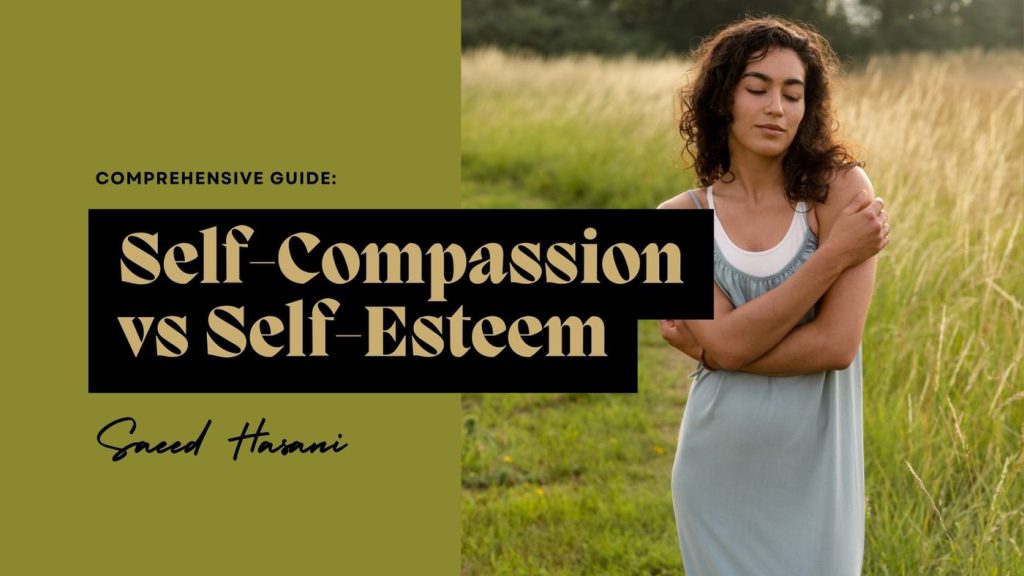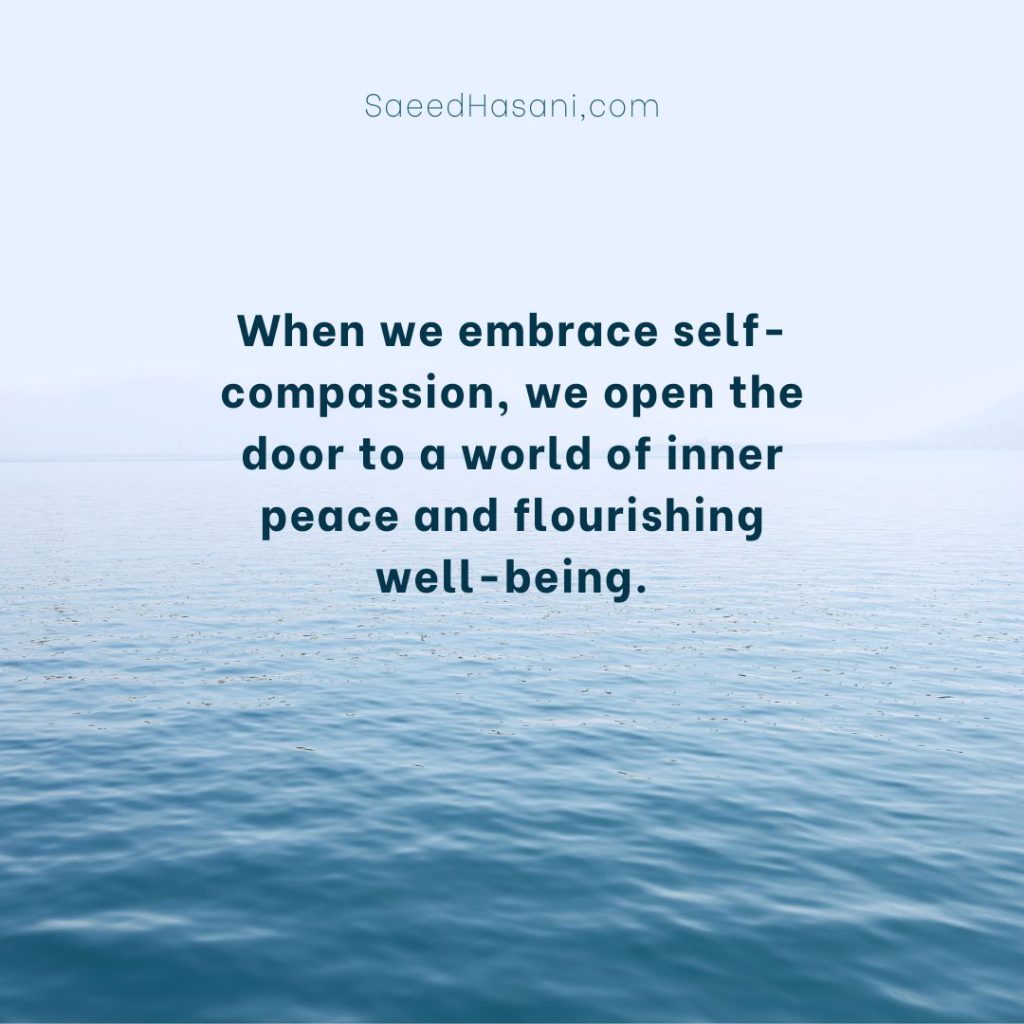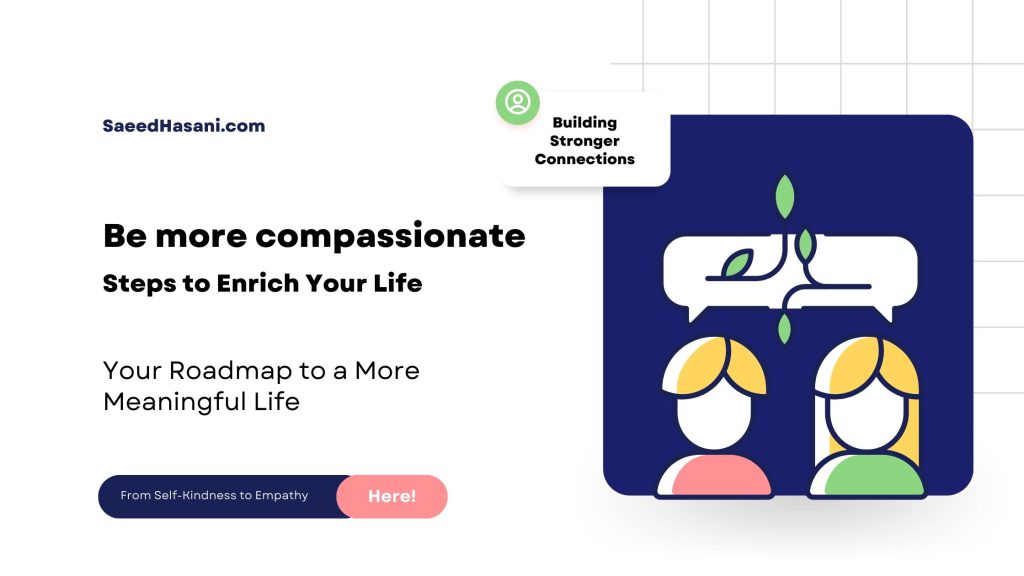Self-Compassion vs Self-Esteem: Comprehensive Guide + 7 Ways to Replace it!

Are you tired of chasing self-worth through endless achievements and external approval? Discover the powerful difference between Self-Compassion vs Self-Esteem, and why the former might be the key to lasting emotional well-being.
Dive into our guide and learn how to cultivate self-compassion to transform your relationship with yourself. Ready to find a more stable and nurturing source of self-worth? Keep reading to embark on this transformative journey.
Content Overview:
The Space Between Self-Compassion vs Self-Esteem
In today’s fast-paced and competitive world, many of us have been conditioned to seek validation and self-worth through achievements, appearances, and the approval of others.
However, this relentless pursuit of self-esteem can often lead to a sense of unworthiness and self-criticism when we fall short of our own expectations or face inevitable challenges. So, what if there was a more nurturing and sustainable way to foster a positive sense of self?
Welcome to the transformative journey of replacing self-esteem with self-compassion. Unlike the traditional self-esteem approach that relies on external validation, self-compassion is a profound practice of self-kindness, understanding, and acceptance, especially during times of difficulty, failure, or suffering.
It involves treating ourselves with the same warmth and care that we would offer to a dear friend, acknowledging that we are all imperfect human beings navigating life’s unpredictable journey together.
In this blog post, we will explore the essential steps to cultivate self-compassion and the significant difference between self-compassion and self-esteem.
We will also delve into how embracing self-compassion can contribute to your overall well-being, fostering emotional resilience, mental health, self-acceptance, and stronger relationships.
Moreover, we’ll uncover the research-backed benefits of self-compassion and its connection to mindfulness, happiness, and fulfillment.
If you’re ready to embark on a journey of self-discovery and embrace a kinder, more compassionate relationship with yourself, then keep reading.
Let’s step away from the pursuit of elusive self-esteem and venture into the realm of self-compassion, where you can find a stable and unconditional source of self-worth and well-being.
A Deep Look At Self-Compassion
Self-compassion, an essential element of emotional well-being, involves treating oneself with the same kindness and understanding during times of difficulty that one would extend to a good friend.
The concept, popularized by Dr. Kristin Neff, is rooted in Buddhist traditions and has been extensively studied within the field of psychology.
Understanding Self-Compassion
Self-compassion comprises three main components:
Self-Kindness vs. Self-Judgment:
- Self-kindness involves being warm and understanding toward oneself when encountering pain or failure, rather than being harshly self-critical.
- Self-judgment tends to exacerbate feelings of inadequacy and self-criticism, leading to further emotional distress.
Common Humanity vs. Isolation:
- Common Humanity recognizes that suffering and personal inadequacy are part of the shared human experience. Acknowledging that others face similar struggles can foster a sense of connection.
- Isolation results in a sense of being alone in one’s suffering, which can increase feelings of loneliness and frustration.
Mindfulness vs. Over-Identification:
- Mindfulness entails being aware of the present moment without judgment, allowing individuals to observe their thoughts and feelings with a sense of openness and curiosity.
- Over-identification involves getting swept up in negative emotions and thoughts, making it difficult to maintain a balanced perspective.
Benefits of Self-Compassion
Research has shown that self-compassion offers numerous psychological and physical benefits:
- Enhanced Emotional Resilience: Individuals who practice self-compassion are better able to cope with stress, failure, and adversity. They tend to have lower levels of anxiety and depression.
- Improved Mental Health: Self-compassion is associated with greater psychological well-being, including increased happiness, life satisfaction, and reduced stress.
- Healthier Relationships: Those who are self-compassionate often have better interpersonal relationships. They are more likely to be empathetic, supportive, and forgiving toward others.
- Greater Motivation: Contrary to the belief that self-compassion leads to complacency, it actually fosters motivation by reducing fear of failure and promoting a growth mindset.
Cultivating Self-Compassion
Practicing self-compassion involves several strategies that can be integrated into daily life:
- Self-Compassionate Phrases: During difficult times, use compassionate self-talk. Phrases like “This is a moment of suffering,” “Suffering is a part of life,” and “May I be kind to myself in this moment” can be comforting.
- Mindfulness Meditation: Regular mindfulness practices can help individuals become more aware of their thoughts and feelings without judgment. Mindfulness meditation encourages a balanced perspective and reduces over-identification with negative emotions.
- Writing Exercises: Writing about one’s experiences and addressing oneself with compassion can foster self-kindness. Letters of self-compassion and journaling can be particularly effective.
- Physical Self-Compassion: Simple acts like placing a hand on one’s heart, giving oneself a hug, or using a soothing tone can activate the body’s calming system and reduce stress.
- Seek Support: Connecting with others who practice self-compassion or seeking guidance from a therapist can provide valuable insights and encouragement.
Challenges in Practicing Self-Compassion
While self-compassion is beneficial, it can be challenging to practice, particularly for those who have a strong inner critic or are accustomed to harsh self-judgment. Common obstacles include:
- Misconceptions: Beliefs that self-compassion is self-indulgent or weak can hinder its practice. Understanding that self-compassion involves a balanced approach to oneself is crucial.
- Resistance to Change: Deep-seated habits of self-criticism can be resistant to change. Consistent practice and patience are necessary to develop self-compassion.
Self-compassion is a powerful tool for enhancing emotional resilience and overall well-being. By embracing self-kindness, recognizing common humanity, and practicing mindfulness, individuals can cultivate a more compassionate relationship with themselves.
As with any skill, developing self-compassion takes time and effort, but the rewards are profound, leading to a more balanced and fulfilling life.

How to Replace Self-Compassion rather than Self-Esteem?
Replacing self-esteem with self-compassion involves shifting your focus from evaluating your self-worth based on external factors to developing a kind and understanding attitude toward yourself. Here are some steps to cultivate self-compassion:
1. Recognize self-criticism: Pay attention to your inner voice and notice when it becomes self-critical. Identify the negative self-talk and the areas where you tend to be hard on yourself.
2. Practice self-awareness: Develop mindfulness to become aware of your thoughts, emotions, and physical sensations without judgment. This allows you to observe yourself with kindness and compassion rather than getting caught up in self-criticism or negativity.
A groundbreaking study by Neff and Germer examines the effectiveness of the Mindful Self-Compassion program, which incorporates mindfulness and self-compassion practices.
The findings indicate that participants who engaged in the program showed significant increases in self-compassion and reductions in self-criticism .
3. Cultivate self-kindness: Treat yourself with the same kindness and care that you would extend to a friend. Instead of berating yourself for mistakes or shortcomings, offer words of encouragement and understanding. Practice self-talk that is supportive, nurturing, and forgiving.
4. Embrace common humanity: Recognize that everyone makes mistakes and experiences struggles. Understand that you are not alone in your imperfections and that it is a natural part of being human. Rather than isolating yourself in self-judgment, foster a sense of connection and empathy towards others.
5. Practice self-compassionate self-reflection: When faced with a challenging situation or a mistake, reflect on it with self-compassion.
Acknowledge your feelings without judgment and remind yourself that mistakes are opportunities for growth and learning. Focus on how you can improve or make amends rather than dwelling on self-criticism.
6. Set realistic expectations: Avoid setting impossibly high standards for yourself. Recognize that you are human and that perfection is unattainable. Set realistic goals and be flexible with yourself when things don’t go as planned.
7. Seek support: Reach out to friends, family, or a therapist who can provide a compassionate ear and help you develop self-compassion. Sharing your struggles and receiving support from others can reinforce the idea that you are worthy of kindness and understanding.
Remember, developing self-compassion is an ongoing process. Be patient with yourself and practice self-compassion consistently, even when it feels challenging. Over time, you will cultivate a healthier and more compassionate relationship with yourself.

What is the Difference Between Self-Compassion and Self-Esteem?
Self-compassion refers to treating oneself with kindness, understanding, and acceptance in times of difficulty, failure, or suffering. It involves being gentle and supportive toward oneself, offering comfort and care like you would to a friend.
Self-compassion recognizes that everyone makes mistakes and experiences challenges, and it fosters a sense of common humanity.
On the other hand, self-esteem is more focused on evaluating one’s worth based on external factors such as achievements, appearance, and social validation. It involves forming a positive opinion of oneself and feeling a sense of value and self-confidence.
Self-esteem often relies on comparisons with others and can be influenced by fluctuating circumstances or feedback from others.
While self-compassion emphasizes self-care, understanding, and embracing imperfections, self-esteem is more about self-evaluation and seeking validation from external sources.
Self-compassion can be seen as a more stable and unconditional source of self-worth, while self-esteem can be more vulnerable to fluctuations and external influences.
Self-Compassion:
- Treats oneself with kindness, understanding, and acceptance.
- Involves being gentle, supportive, and caring toward oneself.
- Offers comfort and care in times of difficulty, failure, or suffering.
- Recognizes that mistakes and challenges are part of being human.
- Fosters a sense of common humanity and connection.
- Embraces imperfections and encourages self-care.
- Provides a stable and unconditional source of self-worth.
Self-Esteem:
- Focuses on evaluating one’s worth based on external factors.
- Relies on achievements, appearance, and social validation.
- Involves forming a positive opinion of oneself and feeling self-confident.
- It can be influenced by comparisons with others and fluctuating circumstances.
- Seeks validation and approval from external sources.
- May be vulnerable to fluctuations and external influences.
- It can contribute to a sense of self-worth based on external factors.

Healthy Self-Esteem Vs. Unhealthy Self-Esteem
Understanding the difference between healthy and unhealthy self-esteem is crucial for our mental and emotional well-being. Let’s dive into what sets them apart and why it matters.
Healthy Self-Esteem
Healthy self-esteem is all about having a balanced and realistic sense of self-worth. Here’s what it looks like:
Confidence Without Arrogance:
- Healthy Self-Esteem: You believe in your abilities and feel confident in what you can achieve. You know your strengths and weaknesses and accept them as part of who you are.
- Unhealthy Self-Esteem: Arrogance or an inflated sense of self can creep in, making you feel superior to others. This often masks underlying insecurities.
Resilience in the Face of Criticism:
- Healthy Self-Esteem: You can handle criticism and setbacks with a level head. Instead of feeling crushed, you see these as opportunities to learn and grow.
- Unhealthy Self-Esteem: Criticism feels like a personal attack, leading to defensiveness or a complete breakdown in confidence.
Healthy Boundaries:
- Healthy Self-Esteem: You set and respect personal boundaries. You know when to say no and understand that it’s okay to prioritize your needs.
- Unhealthy Self-Esteem: You might struggle to say no, leading to burnout and resentment, or you might be overly rigid, pushing others away.
Positive Self-Perception:
- Healthy Self-Esteem: You have a generally positive view of yourself. You recognize your worth and value without needing constant validation from others.
- Unhealthy Self-Esteem: Your self-worth is overly dependent on others’ opinions and external achievements. Without constant praise, you might feel worthless.
Realistic Goal Setting:
- Healthy Self-Esteem: You set achievable goals and celebrate your progress. You’re motivated by personal growth rather than the fear of failure.
- Unhealthy Self-Esteem: You might set unrealistic goals and be overly critical when you don’t meet them, leading to a cycle of disappointment and self-doubt.
Unhealthy Self-Esteem
Unhealthy self-esteem can manifest in two ways: either as low self-esteem or as an inflated sense of self-importance. Let’s explore both:
Low Self-Esteem:
- Signs: Constant self-criticism, fear of failure, and a persistent feeling of not being good enough.
- Impact: It can lead to anxiety, depression, and a lack of motivation. You might avoid challenges and opportunities because you fear you can’t handle them.
Inflated Self-Esteem:
- Signs: Overestimating your abilities, dismissing others’ opinions, and needing to be right all the time.
- Impact: This can result in strained relationships and a lack of genuine personal growth. You might miss out on learning from others because you believe you already know everything.
How to Cultivate Healthy Self-Esteem
Developing healthy self-esteem takes time and practice. Here are some tips:
- Practice Self-Compassion: Treat yourself with the same kindness and understanding you would offer a friend. Acknowledge your flaws without harsh judgment.
- Celebrate Small Wins: Recognize and celebrate your achievements, no matter how small. This reinforces a positive self-image.
- Set Realistic Goals: Aim for progress, not perfection. Break your goals into manageable steps and appreciate each milestone.
- Surround Yourself with Positive Influences: Spend time with people who uplift and support you. Positive relationships can reinforce a healthy self-image.
- Challenge Negative Self-Talk: Pay attention to your inner dialogue. When you catch yourself thinking negatively, challenge those thoughts and reframe them in a positive light.
- Seek Professional Help if Needed: Therapy or counseling can provide valuable tools and perspectives for building healthy self-esteem.
Healthy self-esteem is about having a balanced view of yourself—acknowledging your strengths and weaknesses, setting realistic goals, and treating yourself with kindness.
By recognizing the signs of unhealthy self-esteem and taking steps to cultivate a healthier self-view, you can enhance your overall well-being and lead a more fulfilling life. Remember, it’s a journey, not a destination, and every small step counts.
How does Self-Compassion Contribute to Overall Well-Being?
Self-compassion contributes to overall well-being in the following ways:
1. Reduces self-criticism: Self-compassion helps to quiet the inner critic and reduces negative self-talk. It allows you to be kinder and more understanding toward yourself, which promotes emotional well-being.
In a book chapter titled “Self-compassion: What it is, what it Does, and How it Relates to Mindfulness,” Kristin Neff and Katherine A. Dahm delve into the transformative nature of self-compassion and its connection to mindfulness.
This chapter, found in the Handbook of Mindfulness and Self-Regulation, offers valuable insights into how self-compassion can reduce self-criticism and foster emotional well-being .
2. Enhances resilience: By offering support and kindness during challenging times, self-compassion helps build resilience. It provides the emotional resources needed to bounce back from setbacks and persevere through difficulties.
In a study conducted by Sirois and Kitner (2015), published in the journal Health Psychology, the relationship between self-compassion, emotional experience, and health-promoting behaviors was examined.
The findings shed light on the remarkable impact of self-compassion on buffering against negative emotions and fostering adaptive coping strategies, ultimately contributing to overall resilience and well-being .
3. Improves mental health: Self-compassion is linked to lower levels of anxiety, depression, and stress. It promotes emotional balance, self-acceptance, and a healthier perspective on life’s ups and downs.
4. Fosters self-care: Self-compassion encourages self-care practices that nourish your physical, emotional, and mental well-being. It reminds you to prioritize your needs and engage in activities that bring you joy and fulfillment.
5. Cultivates self-acceptance: Rather than striving for perfection or comparing yourself to others, self-compassion fosters self-acceptance. It allows you to embrace your flaws and imperfections, leading to greater self-fulfillment and contentment.
In her book titled “The Gifts of Imperfection: Letting Go of Unrealistic Expectations and Embracing Your Authentic Self,” Brené Brown, a respected researcher and author, delves into the significance of self-acceptance and embracing our flaws.
Brown emphasizes the pivotal role that self-compassion plays in nurturing self-acceptance and leading a fulfilling life characterized by authenticity and wholeheartedness .
6. Strengthens relationships: When you practice self-compassion, you extend that same understanding and kindness to others. This helps build healthier and more compassionate relationships, enhancing your overall social well-being.
7. Promotes emotional regulation: Self-compassion provides a supportive internal environment to process and regulate emotions. It allows you to acknowledge and validate your feelings without judgment, leading to greater emotional well-being.
8. Boosts self-confidence: By treating yourself with kindness and understanding, self-compassion enhances self-confidence. It helps you develop a positive and realistic self-image, leading to increased self-assurance and self-belief.
In his widely acclaimed book titled “The Confidence Gap: Bridging the Gap between Fear and Self-Belief,” psychologist Russ Harris delves into the concept of self-compassion and its profound influence on self-confidence.
With expertise and insight, Harris emphasizes how practicing self-compassion can empower individuals to conquer their fears and self-doubt, ultimately fostering a significant boost in their overall confidence .
9. Cultivates mindfulness: Self-compassion is closely tied to mindfulness, which involves being present and non-judgmental. This practice can reduce stress, increase self-awareness, and promote overall well-being.
10. Nurtures happiness and fulfillment: Ultimately, self-compassion contributes to a greater sense of happiness and fulfillment. It allows you to navigate life’s challenges with kindness and resilience, fostering a positive and meaningful life experience.
By embracing self-compassion, you can positively impact various aspects of your well-being, leading to a more fulfilling and balanced life.
Conclusion
In summary, the journey from self-esteem to self-compassion offers a more stable and nurturing foundation for self-worth. Unlike self-esteem, which often relies on external validation and fluctuates with achievements and opinions, self-compassion provides an inner sense of kindness and acceptance, even in times of difficulty. Embracing self-compassion fosters emotional resilience, enhances mental health, and promotes a deeper, more unconditional sense of well-being.
Sources:







Responses